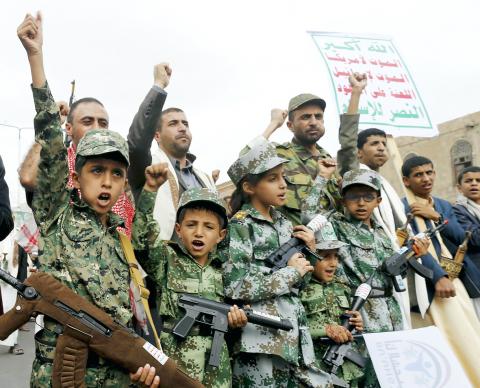A Saudi-led airstrike in Taiz Province, Yemen, killed at least 55 people and left others injured, Houthi-controlled news agency Saba said yesterday.
Other sources said more than 120 civilians had been killed and more than 150 wounded after shelling in a residential area on Friday evening.
A coalition of Arab states, led by Saudi Arabia, has been bombarding Iran-allied Houthi forces in Yemen since late March in a bid to reinstate Yemeni President Abd-Rabbu Mansour Hadi, who has fled to Riyadh.

Photo: Reuters
Saba quoted a source in Taiz as saying that the bombing targeted the town of Mokha in an area inhabited mostly by engineers and workers of a power station, as well as some displaced families.
The number of casualties was expected to rise, as rescue services were still working in the area and several of those injured and transferred to nearby hospitals are in serious condition, the source said.
Yemeni officials, speaking on condition of anonymity because they were not authorized to speak to reporters, said that most of the houses in the area were leveled and a fire broke out in the port city of Mokha. Most of the corpses, including children, women and elderly people, were charred by the flames, they said.
Ahmed Mohammed al-Mouzay, a resident of the area who helped in rescue operations, said most of his neighbors had been killed.
Many of the dead and wounded were transported in private cars or in animal-drawn carts drawn to hospitals, he said.
A Yemeni security official said it was not possible to move the injured into the provincial capital because of road closures due to ongoing fighting.
Security officials said the attack came after Saudi-led coalition planes launched dozens of airstrikes on positions of Shiite Houthi rebels and their allies in Mokha.
The closest Houthi outpost to Friday evening’s deadly strike is at least 5km away, officials and area residents said.
Saudi officials could not immediately be reached for comment.

MAKING WAVES: China’s maritime militia could become a nontraditional threat in war, clogging up shipping lanes to prevent US or Japanese intervention, a report said About 1,900 Chinese ships flying flags of convenience and fishing vessels that participated in China’s military exercises around Taiwan last month and in January have been listed for monitoring, Coast Guard Administration (CGA) Deputy Director-General Hsieh Ching-chin (謝慶欽) said yesterday. Following amendments to the Commercial Port Act (商港法) and the Law of Ships (船舶法) last month, the CGA can designate possible berthing areas or deny ports of call for vessels suspected of loitering around areas where undersea cables can be accessed, Oceans Affairs Council Minister Kuan Bi-ling (管碧玲) said. The list of suspected ships, originally 300, had risen to about 1,900 as

Japan’s strategic alliance with the US would collapse if Tokyo were to turn away from a conflict in Taiwan, Japanese Prime Minister Sanae Takaichi said yesterday, but distanced herself from previous comments that suggested a possible military response in such an event. Takaichi expressed her latest views on a nationally broadcast TV program late on Monday, where an opposition party leader criticized her for igniting tensions with China with the earlier remarks. Ties between Japan and China have sunk to the worst level in years after Takaichi said in November that a hypothetical Chinese attack on Taiwan could bring about a Japanese

MORE RESPONSIBILITY: Draftees would be expected to fight alongside professional soldiers, likely requiring the transformation of some training brigades into combat units The armed forces are to start incorporating new conscripts into combined arms brigades this year to enhance combat readiness, the Executive Yuan’s latest policy report said. The new policy would affect Taiwanese men entering the military for their compulsory service, which was extended to one year under reforms by then-president Tsai Ing-wen (蔡英文) in 2022. The conscripts would be trained to operate machine guns, uncrewed aerial vehicles, anti-tank guided missile launchers and Stinger air defense systems, the report said, adding that the basic training would be lengthened to eight weeks. After basic training, conscripts would be sorted into infantry battalions that would take

DEEP-STRIKE CAPABILITY: The scenario simulated a PLA drill that turned into an assault on Taiwan’s critical infrastructure, with the launchers providing fire support Taiwan yesterday conducted this year’s first military exercises at Longsiang Base in Taichung, demonstrating the newly acquired High Mobility Artillery Rocket System’s (HIMARS) ability to provide fire support and deep-strike capabilities. The scenario simulated an attack on Penghu County, with HIMARS trucks immediately rolling into designated launch areas and firing barrages at the Wangan (望安) and Cimei (七美) islands, simulating the provision of fire support against invading forces. The HIMARS are supposed to “fire and leave,” which would significantly increase personnel and equipment survivability, a military official said. The drill simulated an exercise launched by the Chinese People’s Liberation Army (PLA) Eastern